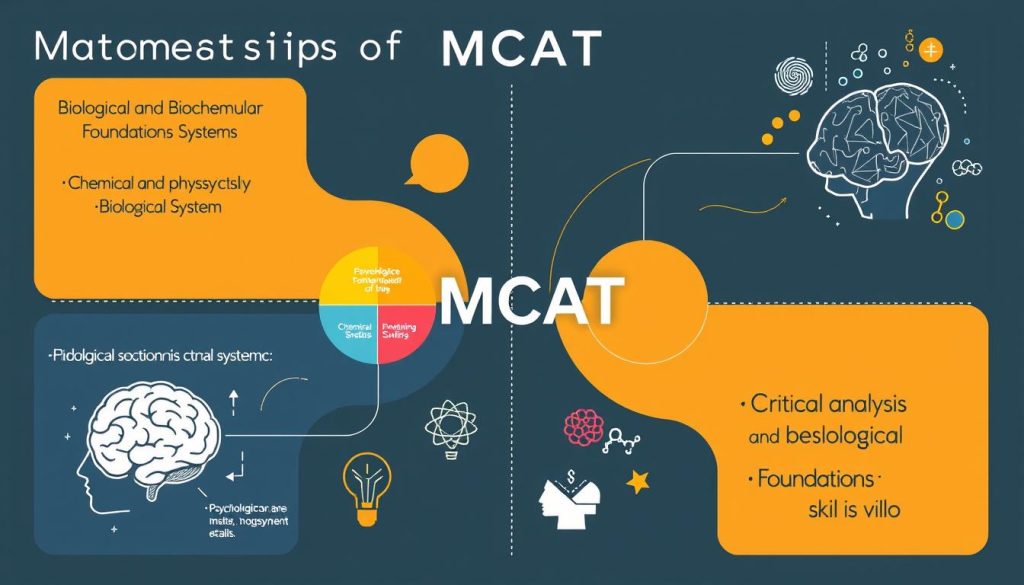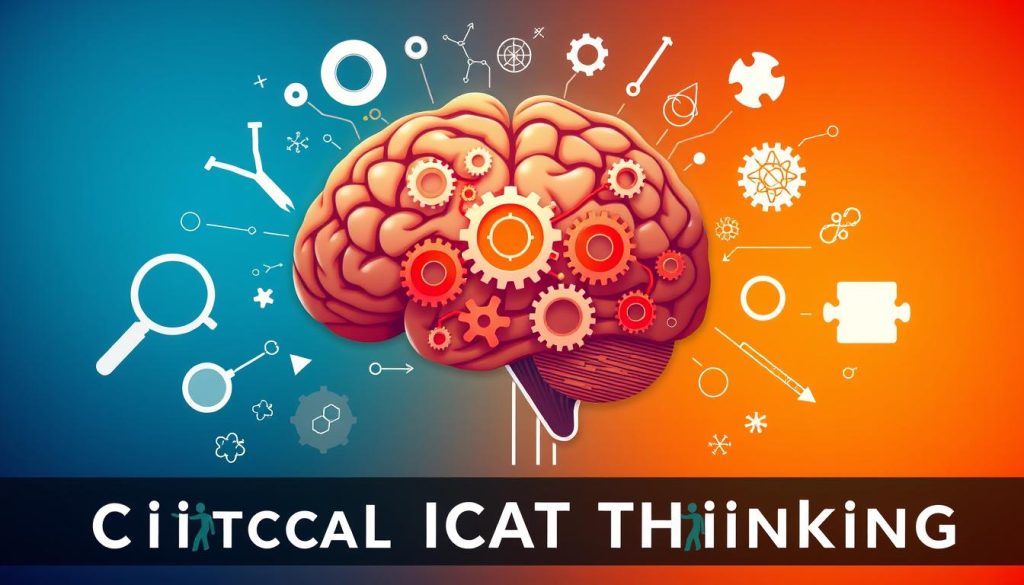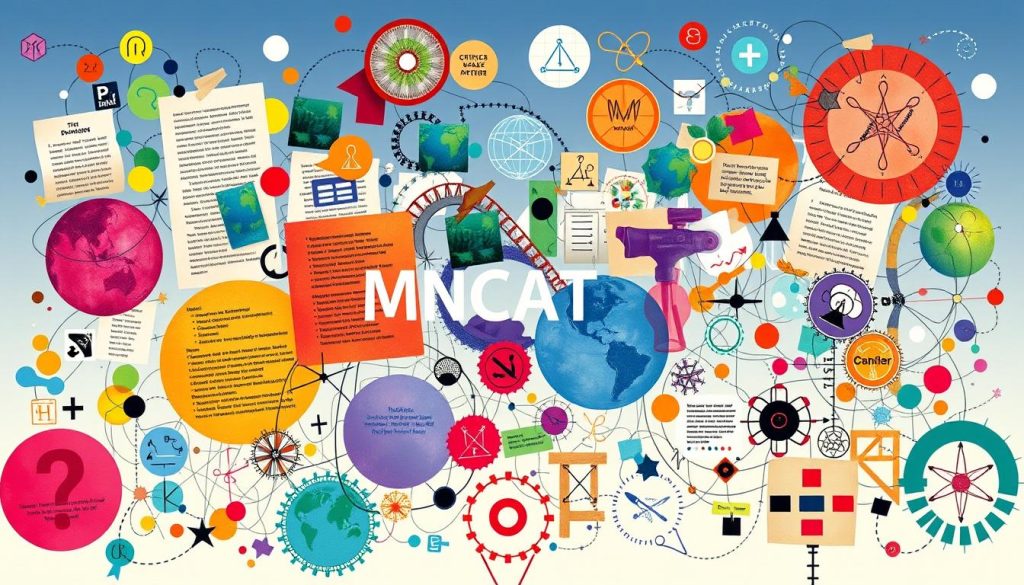Are you ready to face the biggest challenge in pre-med? The Medical College Admission Test (MCAT) is a huge hurdle for aspiring doctors. It’s a test that can either make or break your dream of becoming a doctor. But don’t worry! With the right strategies, you can overcome this challenge and increase your chances of becoming a doctor.
The MCAT is a long and tough exam. It lasts 7 hours and 30 minutes, testing your endurance and knowledge. But here’s the good news: with the right prep, you can turn this challenge into your ticket to medical school.
The MCAT has four main sections, each lasting about 95 minutes. These cover biology, chemistry, psychology, and critical thinking. It’s a test that needs a well-rounded prep approach.
MCAT scores range from 472 to 528, with 500 as the average. In recent years, applicants have scored around 506.5 on average. Don’t let these scores scare you. With the right study plan and resources, you can aim for the top scores!
Should you study alone or join a prep course? Both options have pros and cons. Prep courses offer structure and support but are expensive. Self-study plans are cheaper and flexible, letting you focus on your weaknesses. With resources like Khan Academy and official AAMC tests, you can create a strong study plan without spending a lot.
Key Takeaways
- The MCAT is a 7.5-hour test with four main sections
- Scores range from 472 to 528, with 500 as the median
- Average applicant score in recent cycles is around 506.5
- Self-study plans are often more cost-effective than prep courses
- Official AAMC resources are crucial for effective preparation
- A well-structured study plan is key to MCAT success
Understanding the MCAT Structure
The MCAT format tests your knowledge in various scientific fields. Over 85,000 students take the exam each year. Knowing its structure is key for good preparation.
Test Sections Overview
The MCAT has four main sections, each covering different subjects:
- Biological and Biochemical Foundations of Living Systems
- Chemical and Physical Foundations of Biological Systems
- Psychological, Social, and Biological Foundations of Behavior
- Critical Analysis and Reasoning Skills (CARS)

Scoring System Explained
Understanding MCAT scoring is important. Each section scores from 118 to 132. The total score ranges from 472 to 528. The median score is 500, helping you gauge your performance.
Time Management Considerations
Time management is crucial for the MCAT. The exam lasts 7.5 hours, including breaks. Each section has a 95-minute limit, except for CARS, which is 90 minutes. With 230 questions, pacing yourself is essential.
| Section | Questions | Time (minutes) |
|---|---|---|
| Biological and Biochemical Foundations | 59 | 95 |
| Chemical and Physical Foundations | 59 | 95 |
| Psychological, Social, and Biological Foundations | 59 | 95 |
| Critical Analysis and Reasoning Skills | 53 | 90 |
Knowing the MCAT’s structure, scoring, and timing helps you prepare. Success comes from understanding both the content and format of the MCAT.
Creating an Effective Study Plan

Making a good MCAT study plan is key to doing well. You should plan to study for 12-20 weeks. This gives you enough time to learn all the subjects. First, check what you know and set a score goal, like 515, to help you stay focused.
A good study schedule should divide your time based on each subject’s importance:
- Biology: 25% (44 questions)
- Psychology: 22% (38 questions)
- Biochemistry: 17% (30 questions)
- General Chemistry: 12% (21 questions)
- Sociology: 10% (18 questions)
- Physics: 8% (15 questions)
- Organic Chemistry: 7% (12 questions)
Plan for 300-500 study hours, based on where you start. A three-month plan needs 3-5 hours a day. A six-month plan lets you study at a slower pace. Make sure to include 7-8 full-length practice exams in your plan.
It’s important to take breaks to avoid getting too tired. Take at least one day off each week. Use active learning methods to help you remember what you’ve studied. The AAMC’s Study and Practice Cycle can help you see how you’re doing and improve your studying.
“The key to MCAT success is not just studying hard, but studying smart.”
Also, remember to save money for study materials. The AAMC has free resources, like a practice exam, to help you get used to the test. With a good study plan, you can reach your score goal.
Essential MCAT Prep Materials
Choosing the right MCAT prep materials is key to your success. Let’s look at the various resources available to help you pass the exam.
Official AAMC Resources
The Association of American Medical Colleges (AAMC) has great MCAT prep materials. They include practice exams, question banks, and online flashcards. It’s important to take many official practice tests to get used to the exam format and content.
Recommended Textbooks and Review Guides
MCAT review books are great for studying in-depth. Kaplan, Blueprint MCAT, and Princeton Review are popular choices. These guides cover all MCAT topics and have practice questions. For cheaper options, look for used or older editions.
Online Learning Platforms
Online MCAT courses offer flexibility and interactive learning. Khan Academy has free, high-quality videos and practice questions. UWorld provides detailed explanations for practice passages. Sketchy is good for visual learners, helping to remember information better.
| Resource Type | Examples | Key Features |
|---|---|---|
| AAMC Resources | Official Practice Exams, Question Banks | Most accurate representation of the actual MCAT |
| Review Books | Kaplan, Princeton Review, Examkrackers | Comprehensive content review, practice questions |
| Online Platforms | Khan Academy, UWorld, Sketchy | Interactive learning, visual aids, practice passages |
Using different MCAT prep materials can make a strong study plan. Choose resources that fit your learning style and focus on your weak areas for the best results.

Mastering Content Review Techniques

Effective MCAT content review is key to success. Create a study schedule that covers each topic. Plan for 3.5 months of review and 1.5 months of practice exams. This ensures you cover all subjects well.
To improve your MCAT study, use different resources. Mix online videos, textbooks, and question banks. Many find watching videos at 2x speed helps them learn faster. Also, start practicing questions early.
Flashcards are great for retaining MCAT knowledge. Make over 4000 flashcards and spend 150 hours reviewing them. This method helps solidify key concepts and boosts recall.
- Complete all AAMC question packs during content review
- Gradually increase the number of practice questions each day
- Schedule full-length exams early and increase frequency as the test date nears
Don’t forget to take care of yourself during MCAT content review. Regular breaks and rest are crucial for retaining information. Adjust your study plan as needed to tackle weaknesses and improve.
“Overstudy within reason for comprehensive preparation.”
By using these MCAT study techniques, you’ll get the most out of your content review. This will increase your chances of success on test day.
Developing Critical Thinking Skills
Mastering MCAT critical thinking is key to doing well on the exam. The MCAT tests your ability to analyze complex information and draw logical conclusions. Let’s explore strategies to enhance your MCAT analytical reasoning and scientific inquiry skills.
Analytical Reasoning Strategies
To improve your MCAT analytical reasoning, practice with complex passages and data interpretation questions. The CARS section, which doesn’t require specific content knowledge, is perfect for honing these skills. Use the MCAT Official Prep Hub to access free Sample Tests and video resources for CARS practice.

Scientific Inquiry Methods
Enhance your MCAT scientific inquiry skills by focusing on experimental design and hypothesis testing. Engage with passages from various scientific disciplines. The Chemistry and CARS sections particularly emphasize critical reading skills.
Interdisciplinary Approach
Adopt an interdisciplinary approach to MCAT preparation. Connect concepts across biology, chemistry, physics, and social sciences. Read widely from social sciences and humanities sources. Project Gutenberg and Authorama offer free non-copyright material for additional practice.
- Join study groups to practice critical reading skills
- Highlight key words and take notes while reading passages
- Translate main ideas into your own words
- Build experience reading texts from various disciplines
By developing these critical thinking skills, you’ll be better prepared to tackle the diverse challenges of the MCAT exam.
Effective Practice Test Strategies
MCAT practice tests are key for your exam prep. They mimic the real test, helping you manage time and pace. Regularly taking full-length exams lets you see your progress and get ready for the big day.
Studies show a two-round study plan with practice tests works better than just studying. Start practice tests halfway through your study time. For example, if you study for 6 months, start at the 3-month mark.

| Tier | Test Providers | Similarity to MCAT |
|---|---|---|
| Tier 1 | AAMC | Most similar |
| Tier 2 | Examkracker, Next Step, The Berkeley Review | Valuable but challenging |
| Tier 3 | Kaplan, Gold Standard, The Princeton Review | Less similar |
Experts say take 7-10 full-length practice exams. A typical test takes about 7 hours and 27 minutes. Focus on test day conditions and review each question to find your weak spots.
“Practice tests are not just about scoring. They’re about learning, adapting, and growing stronger with each attempt.”
Remember, it’s normal to see score changes. Stay positive and see each test as a chance to get better for the real exam.
MCAT-Specific Question Types and Approaches
The MCAT tests your scientific knowledge and critical thinking. Knowing the different question types is key to doing well.
Passage-Based Questions
Passages are a big part of the MCAT. Each science section has 10 passages with 4-7 questions. These questions check if you can find important info and apply scientific ideas to new situations.

Standalone Questions
Each science section also has 15 standalone questions. These questions test your knowledge without a passage. They often ask for quick recall of facts and principles.
Data Interpretation
Data interpretation questions are in both passage-based and standalone formats. They test your skill in analyzing graphs, charts, and experimental results. Being good at data interpretation is crucial for the MCAT.
| Section | Passage Questions | Standalone Questions | Total Questions |
|---|---|---|---|
| Chemical and Physical Foundations | 44 | 15 | 59 |
| Biological and Biochemical Foundations | 44 | 15 | 59 |
| Psychological, Social, and Biological Foundations | 44 | 15 | 59 |
| CARS | 53 | 0 | 53 |
To do well on the MCAT, practice a lot with official AAMC materials. Work on strategies to quickly find important info in passages. Also, improve your data interpretation skills. Success on the MCAT is not just about knowing the content. It’s about applying it well to different situations.
Enhancing CARS Performance
The MCAT CARS section tests your reading skills. You’ll face 9-10 passages and 53 questions in 90 minutes. It’s essential to use effective strategies to succeed.
Improving your performance requires focus on a few key areas:
- Practice active reading techniques
- Develop time management skills
- Enhance critical thinking abilities
Many struggle with time in the CARS section. Try to spend 3-4 minutes on each passage. If a text seems dull, take a 5-second break to rest your eyes. You don’t need to know every detail. Just grasp the main ideas and the author’s view.

| Component | Details |
|---|---|
| Passages | 9-10 |
| Questions | 53 |
| Time Limit | 90 minutes |
| Score Range | 118-132 |
By using these strategies and understanding the CARS section, you’ll improve. Remember, practice is crucial for better reading and verbal skills.
Boosting Science Section Scores
To improve your MCAT science scores, focus on specific areas. We’ll look at strategies for biology, biochemistry, chemistry, physics, psychology, and sociology. This will help you excel in each subject.
Biology and Biochemistry Focus
For biology and biochemistry, focus on cellular processes and metabolism. Make flashcards for important enzymes and pathways. Practice using these concepts in real-world situations.
This approach will deepen your understanding of biological systems.
Chemistry and Physics Strategies
In chemistry and physics, learn the basics well. Regularly solve practice problems. Pay attention to unit conversions and dimensional analysis.
Many physics questions are simple math. Develop a strategy to solve complex questions quickly.
Psychology and Sociology Concepts
For psychology and sociology, study key theories and research methods. Learn about social determinants of health. Use mnemonics to remember important concepts.
Apply these ideas to passages about human behavior and social interactions.

| Science Section | Key Focus Areas | Study Strategies |
|---|---|---|
| Biology/Biochemistry | Cellular processes, Metabolism | Flashcards, Concept application |
| Chemistry/Physics | Foundational principles, Calculations | Regular practice, Unit conversions |
| Psychology/Sociology | Theories, Research methods | Mnemonics, Passage analysis |
It’s important to connect ideas across subjects. This broad approach will help you tackle tough questions. It will also boost your science section scores.
Time Management During the Exam
Mastering MCAT time management is key to success. The exam has four sections, each with its own time limit. To do well, you need good MCAT pacing strategies and test-taking skills.

| Section | Time Limit | Questions |
|---|---|---|
| Chemical and Physical Foundations of Biological Systems | 95 minutes | 59 |
| Critical Analysis and Reasoning Skills | 90 minutes | 53 |
| Biological and Biochemical Foundations of Living Systems | 95 minutes | 59 |
| Psychological, Social, and Biological Foundations of Behavior | 95 minutes | 59 |
To get better at MCAT time management, practice quick reading. Learn to skim passages for the main points. Spend about 10-12 minutes per passage during study sessions. This will help you pace yourself for the exam.
Boost your MCAT test-taking skills by spotting keywords and focusing on key questions. Regular practice with MCAT-style questions will get you used to the question types and difficulty levels. This will help you manage your time better on test day.
“Efficient problem-solving techniques are essential for increasing speed while maintaining accuracy in the MCAT exam.”
Don’t forget to balance your MCAT prep with other life commitments. Use commute or lunch breaks for studying. Find study buddies or work with mentors. Focus on topics that matter most to your score, your strengths, or interests. This will help you use your time wisely.
Mental Preparation and Test Day Strategies
Getting ready for the MCAT mentally is key. Begin by setting a regular sleep schedule a few weeks before the test. This ensures you’re refreshed and alert on the day of the exam. Try stress management methods like deep breathing or visualization to keep your cool under pressure.
Here are some important tips for the MCAT test day:
- Arrive at the testing center 30 minutes early
- Bring necessary identification and snacks
- Use breaks for light stretching and relaxation
- Maintain a positive mindset throughout the exam

Managing MCAT stress is vital for doing your best. Remember, feeling anxious is normal. View it as a sign you’re ready, not a problem. Keep your breathing steady and stay in the moment. If you feel too stressed, take a quick break to clear your mind and refocus.
“The MCAT is not just a test of knowledge, but also of mental endurance. Stay calm, trust your preparation, and approach each question with confidence.”
Make your mental prep for the MCAT your own. Some like meditation, while others use positive affirmations. Try different methods during practice to find what works for you. By using these strategies, you’ll be ready to tackle the test and aim for a high score.
| Time Before Exam | Action Item |
|---|---|
| 10 days | Rectify ID discrepancies |
| 3 days | Contact AAMC for ID issues |
| 1 day | Pack essentials, review center location |
| Test day | Arrive 30 minutes early, stay positive |
Post-Test Analysis and Score Improvement
After taking the MCAT, it’s key to look at your results and plan how to improve your score. You need to find your weak spots and make a plan to get better.
Identifying Weak Areas
Look at your score report closely to find out where you struggled. Knowing this helps you make a better plan for your next test.

Targeted Improvement Strategies
After finding your weak spots, focus on improving them:
- Work harder on subjects that are tough for you
- Practice more questions in those areas
- Use flashcards to help remember important facts
- Take practice tests to get used to the real test
Retake Considerations
Think about these things if you’re thinking about retaking the MCAT:
| Factor | Consideration |
|---|---|
| Study Time | Make sure you have enough time to work on your weak spots |
| Score Improvement Potential | Figure out how much you can realistically improve your score |
| Application Deadlines | Check if retaking fits with your application schedule |
Quality of study is more important than how much you study. Use the best resources and practice questions from the start. Melanie Ledding, who went from a 505 to a 517, says analyzing your test and studying well are key.
Conclusion
Getting good on the MCAT is like the many talents of Winston Churchill and Frederick Douglass. Your path to medical school starts with learning how to prepare for the MCAT. Knowing the scientific method helps you solve tough questions.
Your MCAT prep is a journey of growth. Churchill was great in many areas by age thirty-two. You can do the same on the MCAT. Work on mastering the content, thinking critically, and improving your test-taking skills.
Like Douglass’s journey to freedom, your MCAT success might face challenges. But with hard work and smart studying, you can beat them. Practice with full-length exams, work on your time management, and get ready for the test day. These steps will help you do your best and reach your MCAT goals, leading to a career in medicine.
FAQ
What is the MCAT exam structure?
The MCAT has four sections. These are Biological and Biochemical Foundations of Living Systems, Chemical and Physical Foundations of Biological Systems, Psychological, Social, and Biological Foundations of Behavior, and Critical Analysis and Reasoning Skills. It lasts about 7 hours and 30 minutes, including breaks.
How is the MCAT scored?
The MCAT scores range from 472 to 528, with a median of 500. Knowing how it’s scored and your target score is key for good prep.
How can I create an effective MCAT study plan?
First, figure out how much time you have and when you want to take the exam. Then, break down the content into smaller parts. Make study plans with breaks and mix up your studying with practice questions.
Focus on areas you’re not good at and take full-length practice tests.
What are the essential MCAT prep materials?
You’ll need official AAMC resources and review books like Kaplan, Princeton Review, and Exam Krackers. Also, use online platforms like Khan Academy. Buy more practice tests from Altius or Blueprint.
How can I effectively review content for the MCAT?
Use active learning methods and space out your studying. Regularly review what you’ve learned before. Summarize info, teach others, and make mnemonic devices to remember better.
How can I develop critical thinking skills for the MCAT?
Practice with complex passages and data questions to get better at analysis. Focus on scientific methods and connect different subjects. This will help you think critically.
Why are practice tests important for MCAT preparation?
Practice tests mimic the real exam. They help you learn to manage your time and pace. Use them to find your strengths and weaknesses and track your progress.
How can I prepare for different MCAT question types?
Practice with all types of questions. Work on quickly finding important info, understanding content, and analyzing data. This will help you with any question type.
How can I improve my CARS performance?
Improve your reading by practicing with different passages. Learn to find main ideas, analyze arguments, and make inferences. Practice reading actively and work on your timing.
How can I boost my science section scores?
Focus on key topics in biology, biochemistry, chemistry, physics, psychology, and sociology. Pay attention to cellular processes, metabolism, and foundational concepts. Also, learn about calculations, theories, research methods, and social determinants of health.
How can I effectively manage my time during the MCAT?
Create a plan for each section, including time for reading, answering, and reviewing. Practice timed sections to get faster and more accurate. Prioritize easy questions and use tools wisely.
How can I mentally prepare for the MCAT?
Use stress management techniques, get enough sleep, and stay positive. On test day, arrive early, bring what you need, and relax during breaks.
How should I analyze my MCAT performance and improve my score?
Look at your score report to find weak areas. Develop strategies to improve and consider retaking if you can. Think about how much time you have and how much you can improve.






